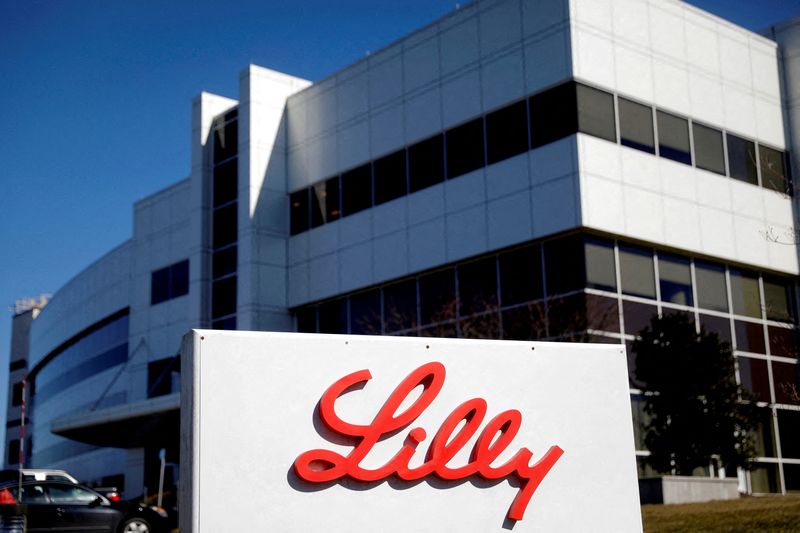By Rene Wagner, Klaus Lauer and Andreas Rinke
BERLIN (Reuters) - U.S. pharmaceuticals company Eli Lilly (NYSE:LLY) plans to build a production plant in western Germany, sources close to the matter told Reuters, with one putting the investment at 2 billion euros ($2.17 billion).
The new site, Lilly's first major production complex in Germany, comes as drugmakers are growing increasingly sensitive to political pressure to manufacture critical healthcare products closer to the markets they serve after the coronavirus pandemic exposed the vulnerability of global supply chains.
Two of the sources said that more than 1,000 jobs would be created, when including an expected boost to sub-contractors and suppliers in the region.
The company declined to comment on the plans but news conferences have been scheduled in the town of Alzey, where sources say the plant will be built, and Berlin on Friday.
The project will be fully funded by the medicines giant,which has seen surging demand for its diabetes drug Mounjaro, people familiar with the matter had told Reuters on Wednesday.
One of the sources said that the new site would make diabetes drugs with the potential use to treat obesity. No further details were available on what the plant would produce.
The Mounjaro injection has been used off-label for weight loss and last week it was cleared for that additional use in the United States under the new brand Zepbound. Lilly's other diabetes drugs include Trulicity.
The town of Alzey, in the Rheinhessen area of the state of Rhineland-Palatinate, is within less than an hour's drive of the headquarters of drugmaker Boehringer Ingelheim and COVID vaccine pioneer BioNTech (NASDAQ:BNTX) and of chemicals giant BASF.
Eli Lilly's plans for a plant look to be a win for the German government, keen to show that Europe's biggest economy remains an attractive manufacturing location despite soaring energy prices caused by the loss of Russian gas following Moscow's invasion of Ukraine.
"This is about a four-digit number of new employees," said one source, adding this included a positive knock-on effect in related businesses such as packaging.
The U.S. company, which has been present in Germany since1960, already has 1,000 employees in the country in areas such as development, distribution and marketing.
The investment comes even as major pharma companies have voiced strong opposition to plans by the European Union to shorten the standard period of protections companies get before generics can enter the market from 10 to eight years.
Major production sites that Lilly runs outside of its U.S. home market are in Ireland, France, Spain, Italy and China, according to its 2022 annual report.
The German project would add to the more than $8 billion the company has currently earmarked for ongoing expansion investments in Indiana, North Carolina, and Limerick, Ireland over the next several years.
Eli Lilly said it would unveil "far-reaching investmentplans" at Friday's news conference, which will be attended byGermany's economy and health ministers.
Other big recent foreign investments in Germany, including chip plants by Intel (NASDAQ:INTC) of the United States and Taiwan's TSMC, were won with the promise of massive public subsidies, making Lilly's fully-funded investment potentially a more positive story for the government.
Mounjaro's success helped Lilly post a 37% gain inthird-quarter revenues to $9.5 billion, topping Wall Streetestimates.
The group's market value has ballooned to around $580billion, up more than 65% so far this year.
As well as winning U.S. approval, Mounjaro is also likely to be approved for wider used against weight loss in the European Union after the bloc's drugs regulator recommended market clearance.
However, in Germany, state health insurance is barred frompaying for weight-loss drugs. Non-diabetic patients with aprescription for weight loss will likely have to pay out oftheir own pockets.
Indianapolis-based Eli Lilly and Danish rival Novo Nordisk (NYSE:NVO) are ahead in a race to grab a slice of an estimated$100 billion global market for anti-obesity treatments from aclass of drugs originally developed for diabetes known as GLP-1agonists.
Lilly has also been a pioneer in developing a treatment forAlzheimer's disease, where it is in a tight race with apartnership between Eisai and Biogen (NASDAQ:BIIB),

It has said it expects the U.S. Food and Drug Administrationto decide in the first quarter whether to approve its newAlzheimer's drug donanemab, and submissions to other globalregulators are underway.
($1 = 0.9219 euros)